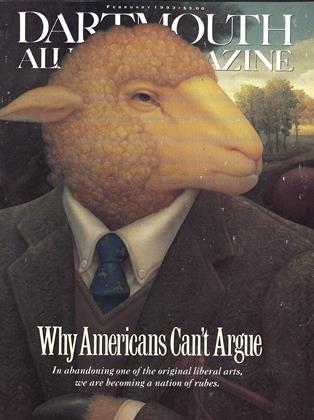NORMAN MAclean '24. has received extraordinary posthumous celebrity. Not only did Robert Redford's movie "A River Runs Through It" receive uniformly fine notices last summer and gain for Maclean's novella thousands of new readers but his last book spent much of the year high on the nation's best-seller lists. Oddly, YoungMen and Fire has made Maclean, who didn't even think of writing books until he retired from teaching in 1973, one of the hottest American writers of the nineties.
Published by the University of Chicago Press from a manuscript nearly completed when Maclean died at 88, Young Men and Fire is a true story about a Montana conflagration that killed 13 young firefighters. In the first part of the book, Maclean recreates the world the manners, the ethos of the brave "smokejumpers" whose job it is to parachute into forest fires and quell them. He does for these kids what Tom Wolfe did for astro- nauts in The Right Stuff.
What might come as a surprise to some is that Maclean's reporting is lively, and his writing is sharp, clever, and even humorous. When a fellow is called "lyrical" over and over, as Maclean has been, he assumes a soft-focus image that's hard to escape. Certain readers want something firmer. Well, they'd get it, if they'd give Maclean a try. "In 1949," Maclean begins, "the smokejumpers were not far from their origins as parachute jumpers turned stunt performers dropping from the wings of planes at county fairs just for the hell of it plus a few dollars, less hospital expenses." While he's building up to the incident in question, there's a lot more living history, wonderfully rendered. Then the tragedy comes as a sudden seizure at the book's heart. It's hard to read, but harder to put down.
The book's latter half is a detective story. It'concerns Maclean's obsession to know whether an "escape" fire set by the smoke-jumpers' foreman actually caused the deaths, as several parents of the victims alleged. YoungMen and Fire is history, natural history, personal history, dramatic narrative, and whodunit in one, with a little philosophy on top; it is Wolfe and McPhee and Christie and Annie Dillard and, I would argue, a match for any of them, each in their own arena. I think it's nothing short of a great book, and when the roll of stellar American writers of the twentieth century is assembled a few years hence, Maclean's name will have two strong books, one fiction and one non-, on his side.
Speaking of Dillard: on the dust jacket of Young Menand Fire she calls the book "deep" and Thomas McGuane calls it "poetic and high-minded" and Pete Dexter "extraordinarily wise" and, yes, "lyrical." Read it anyway.
From young men andwater, he turned to fire.
 View Full Issue
View Full Issue
More From This Issue
-
 Feature
FeatureFor The Sake Of Argument
February 1993 By Jay Heinrichs -
 Feature
FeatureDUKE'S WORLD
February 1993 By ROBERT SULLIVAN '75 -
 Feature
FeatureRoller Screaming
February 1993 By John Morton -
 Feature
FeatureSinging for Walter
February 1993 By Sydney Lea -
 Article
ArticleThe Idealist a Leader
February 1993 By James O. Freedman -
 Article
ArticleImagining the Orient
February 1993 By Douglas Haynes
Robert Sullivan '75
-
 Feature
FeatureThe Real Story Behind the Lower Forty Shooting, Angling and Inside Straight Club
SEPTEMBER 1990 By Robert Sullivan '75 -
 Feature
FeatureDUKE'S WORLD
February 1993 By ROBERT SULLIVAN '75 -
 Article
ArticleDuke's World Revisited
June 1993 By Robert Sullivan '75 -
 Cover Story
Cover StoryNO HOLDS BARD
MARCH 1994 By Robert Sullivan '75 -
 Feature
FeatureThe New New York
Jan/Feb 2002 By ROBERT SULLIVAN '75 -
 FEATURE
FEATUREA Fan’s Notes
MARCH | APRIL 2020 By ROBERT SULLIVAN '75







